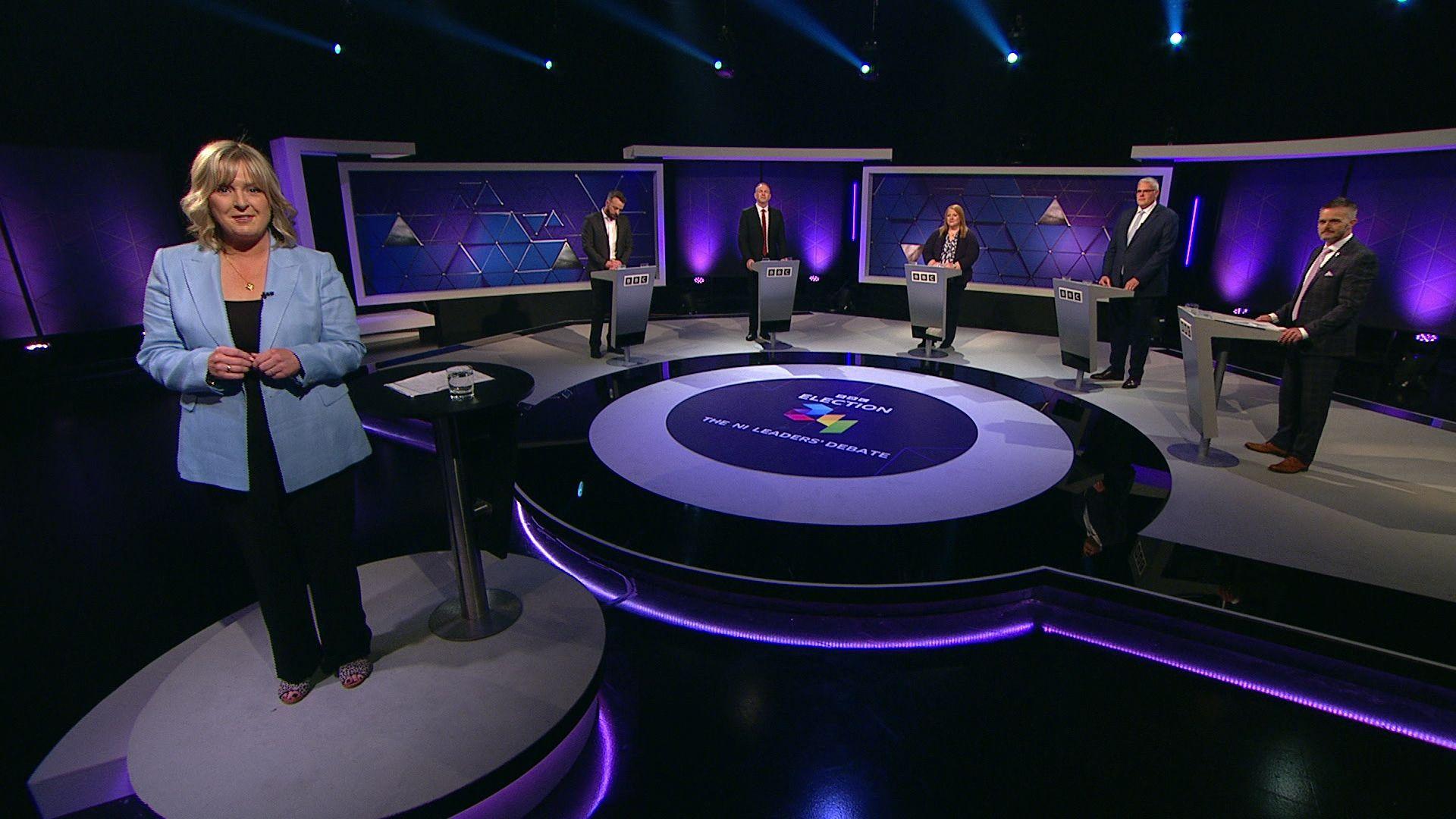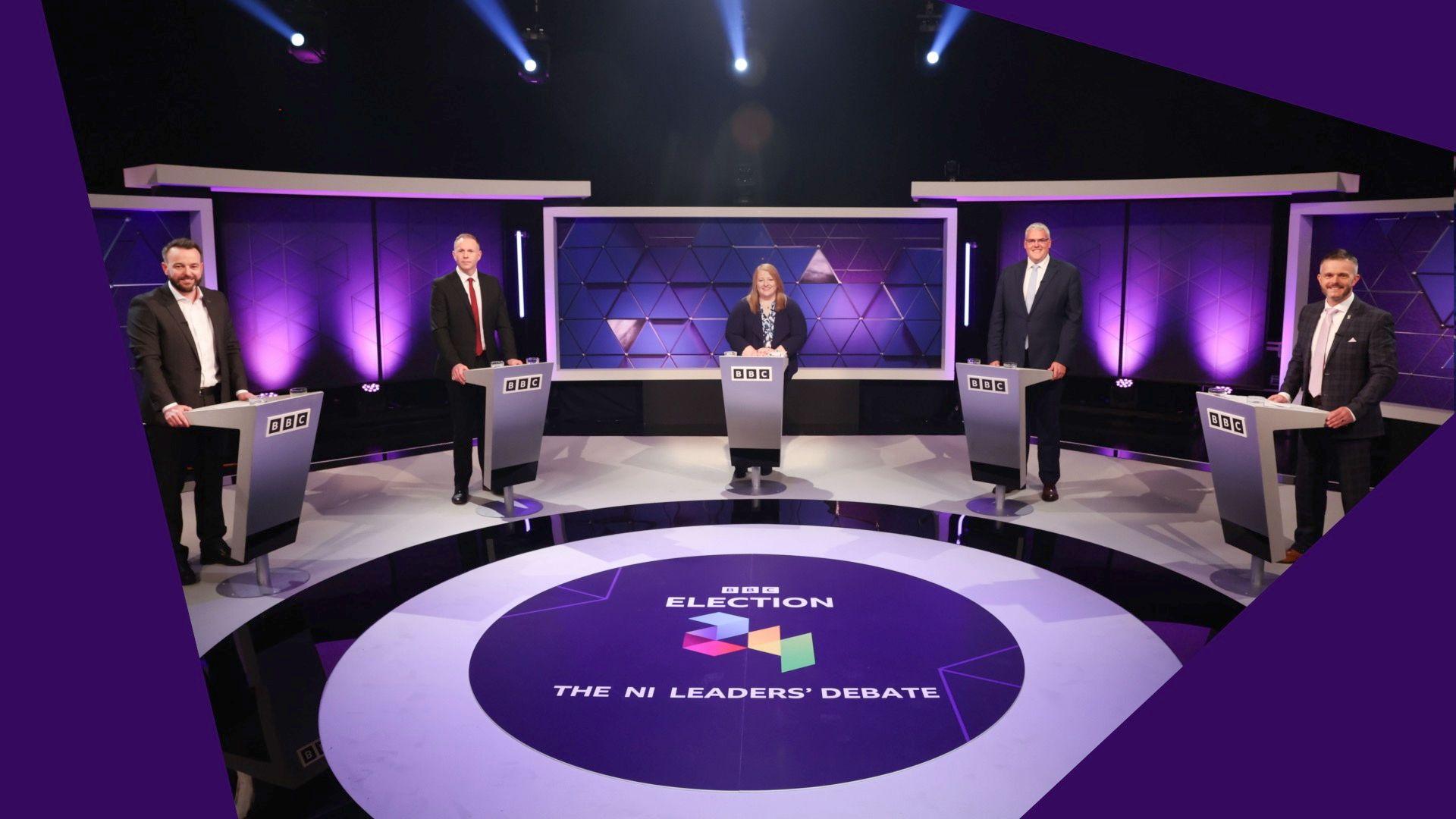Key claims from the election debate fact checked

BBC News NI correspondents look at some of the claims made during the hour-long debate
- Published
Representatives from the five largest political parties in Northern Ireland clashed tonight in the second televised debate of the general election campaign.
Democratic Unionist Party (DUP) leader Gavin Robinson, Sinn Féin Westminster candidate Chris Hazzard, Social Democratic and Labour Party (SDLP) leader Colum Eastwood, Alliance leader Naomi Long and Ulster Unionist Party (UUP) deputy leader Robbie Butler faced a range of questions from a studio audience in Belfast.
The politicians responded to the audience members and debated amongst themselves on issues from the health service to the future of the devolved assembly at Stormont.
BBC News NI correspondents took a look at some of the claims they made during the hour-long programme.
Has Northern Ireland's health budget been cut?
The first question of the night was how the parties justified voting to cut the health service budget.
Following the question from the audience, Gavin Robinson and Naomi Long disputed that the health service budget has been cut.
So what is the reality?
The health budget was up by 6.3% compared to the opening position last year but was down by 2.3% when compared to what was actually spent by the end of last year.
April’s budget involved the allocation of £14.5bn for day-to-day spending, the Department of Health got the largest share of that- £7.76bn.
That was about 6% higher than last year's opening position but it was about £180m less than what the department actually spent by the end of last year.
Health Minister Robin Swann of the UUP said that because this year’s opening position is less than last year’s closing position his budget has been cut.
The other executive parties point out that more money will be allocated to health through reallocation exercises, known as monitoring rounds, so we don’t yet know the total size of health spending.
According to the health department, the budget was inadequate.
The Department of Health has said that it was an injection of £550m from the Treasury in London that filled the hole.
While the comparisons on budget at the start and end of year are both right – the budget required injection from Westminster.
Is Stormont still unstable?
"How can the leaders possibly ask the public to trust them again after years of political breakdown and controversy?"
That was the second question of the night put to the panel.
Naomi Long said Stormont is "no more stable" than it was since the day power-sharing returned in February?
Was she right?
Technically, yes.
The nature of Stormont's structures mean that the Executive can only function with the support of both the largest unionist and nationalist parties.
For the past two years, the DUP kept the institutions down in protest over post-Brexit trade rules.
In 2017, Sinn Féin walked out of government following a dispute with the DUP, which lasted three years.
There have been minor tweaks since then to rules that give the bigger parties vetoes, but Alliance and the SDLP have been calling for large-scale reform.
Any such moves will not only require support from the next UK government, but the DUP and Sinn Féin as well.
Tonight both parties were asked if they will not bring down the institutions again, as they are jointly leading the current government at Stormont.
While the DUP and Sinn Féin largely appear to be working well together right now, on this question they declined to give a steadfast commitment.
Is there full employment in the Republic of Ireland?
In making the economic case for a united Ireland, Colum Eastwood said there was full employment in the Republic of Ireland.
Many economists would agree that the Republic’s unemployment rate of 4% represents "technical" full employment.
This week the ESRI, a leading Dublin-based think tank, said the Irish labour market is now "operating at full capacity, with limited potential for further growth in the absence of inward migration".
It is a similar picture in Northern Ireland where the unemployment rate is 2.2%.
Recent research by Ulster University economists suggest Northern Ireland has the ‘"tightest" labour market of any UK region.
Why did the cost of living not feature?
There was no mention in tonight’s debate of any support towards the cost of living - that’s probably a sign of the economic context of this election.
We know prices aren’t rising as rapidly as they were 18 months ago, with inflation returning to the Bank of England’s 2% target last month for the first time in three years.
However, prices have stabilised at a higher level, which is continuing to put pressure on household finances in Northern Ireland and businesses costs.
No discussion about environmental aims
With a little over 2,000 days to go to a key deadline in Northern Ireland’s road to Net Zero, you might have expected a bit more – or any – talk about some of the environmental challenges facing Northern Ireland.
By 2030, we should, for example:
Be generating 80% of our electricity consumption from renewable sources
Be recycling at least 70% of our waste
Have planted 18,000,000 trees
Have prioritised degraded peatlands for restoration to favourable status
Have cut our greenhouse gas emissions by almost half (48%) compared to 1990
But none of this featured, nor did the challenges of Lough Neagh, the planning frustrations of the renewable energy sector or the pressures on agriculture to cut emissions.

- Published27 June 2024

